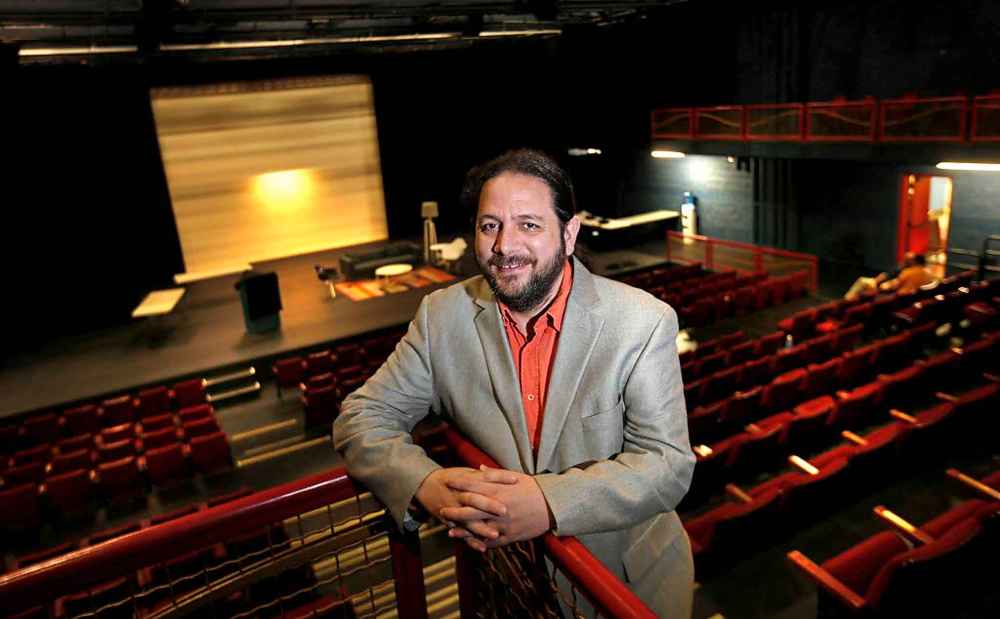The show must go… dark? Actors applaud as more theatres explore lowering the curtain on six-day work week
Read this article for free:
or
Already have an account? Log in here »
To continue reading, please subscribe:
Monthly Digital Subscription
$0 for the first 4 weeks*
- Enjoy unlimited reading on winnipegfreepress.com
- Read the E-Edition, our digital replica newspaper
- Access News Break, our award-winning app
- Play interactive puzzles
*No charge for 4 weeks then price increases to the regular rate of $19.00 plus GST every four weeks. Offer available to new and qualified returning subscribers only. Cancel any time.
Monthly Digital Subscription
$4.75/week*
- Enjoy unlimited reading on winnipegfreepress.com
- Read the E-Edition, our digital replica newspaper
- Access News Break, our award-winning app
- Play interactive puzzles
*Billed as $19 plus GST every four weeks. Cancel any time.
To continue reading, please subscribe:
Add Free Press access to your Brandon Sun subscription for only an additional
$1 for the first 4 weeks*
*Your next subscription payment will increase by $1.00 and you will be charged $16.99 plus GST for four weeks. After four weeks, your payment will increase to $23.99 plus GST every four weeks.
Read unlimited articles for free today:
or
Already have an account? Log in here »
Hey there, time traveller!
This article was published 28/01/2020 (2145 days ago), so information in it may no longer be current.
The five-day work week has been a way of life for many workers since the late 19th century, but one workplace has never adopted this policy: the theatre.
In professional anglophone theatres across the world, the six-day work week reigns supreme. It’s an intense schedule that takes the phrase “the show must go on” to the extreme, sometimes to the detriment of the mental and physical well-being of the workers involved.
In December 2019, the Royal National Theatre in London — one of the most prolific anglophone theatres in the world — announced a trial run of a five-day work week. Would other theatres follow suit?

While there are many barriers facing theatre companies that may be interested in following this example, for Winnipeg theatre artists, this trend is a welcomed change.
“You don’t spend your day thinking of much else,” says actor and director Sarah Constible about theatre’s standard six-day work week, “though that is the nature of theatre as well. It’s very easy to get obsessed with the play at the expense of your real life.”
“It is all-encompassing, which can be a very good thing and also a very challenging thing,” agrees Katie German, an actor, a director and artistic associate at the Manitoba Theatre for Young People.
German is the director of Timothy Findley’s Elizabeth Rex, which opens as a part of ShakespeareFest today. Besides having a day job and being a working artist, she is also mother to a four-year old boy, so flexible work hours are an important factor when she signs on to a new production.
“We did shortened days for our rehearsal process,” says German, “and having the morning to spend with family or working at my other job has been valuable. A six-day week is lovely to really delve into the world of the show and keep your mind focused, but it requires you to give up everything else.”
Flexibility was also on Constible’s mind when she was hired to direct Mary’s Wedding at Theatre Projects Manitoba last year. In collaboration with artistic director Ardith Boxall, the company used a schedule with shorter workdays and work weeks over a longer period of time.
In an industry where the standard rehearsal schedule is six days per week, eight hours per day over three and a half weeks, changing things by just a few hours can have enormous benefits.
“I loved it, and not just because I got to see daylight,” says Constible, who discovered that working fewer hours enabled everyone to be more efficient.

The next generation of theatre artists are also quick to champion a change in the business.
“Doing theatre is very physically, mentally and emotionally draining, and to demand that much of a company is very challenging,” says Angelica Schwartz, a former Winnipegger who is studying directing at the National Theatre School in Montreal.
NTS has both anglophone and francophone theatre programs. While Schwartz is a part of the English program, she is eagerly adopting many of the more flexible policies employed by French theatres.
“The six-day week has given myself and several colleagues severe mental-health concerns,” says Schwartz. “In theatre, we say ‘the show must go on’ at any cost, which requires people’s mental and physical health to be a last priority. We encourage the idea of community, yet we often let ourselves and our colleagues suffer in silence.
“This needs to change.”
At the forefront of francophone theatre in Winnipeg is Théâtre Cercle Molière. Under the direction of Genevieve Pelletier, TCM employs flexible working hours on every project the company undertakes.
“We work in an environment where we have professionals, semi-professionals and sometimes people who have never been on stage before,” says Pelletier. “There’s no French theatre school in Winnipeg, so we’re trying to build capacity and diversity.”

For Pelletier, theatre is both a workspace as well as a creative space and requires a different kind of freedom than a traditional workplace. She is also aware of how the demanding schedule disproportionately affects low-income artists, artists from diverse backgrounds and women in general and contributes to a lack of diversity in the industry.
“There’s a huge gender and socioeconomic component,” says Pelletier. “The rehearsal schedule we’re used to can be a barrier.”
In professional theatres that engage artists through the Canadian Actor’s Equity Association and the Professional Association of Canadian Theatres, schedules are dictated by what is set in the Canadian Theatre Agreement, which outlines the policies and pay rates for theatre productions.
Local signatories of CTA include the Royal Manitoba Theatre Centre, Prairie Theatre Exchange and the Manitoba Theatre for Young People. But even at these major companies, artistic directors are hungry for change.
“Yes, this is the way we work,” says MTYP artistic director Pablo Felices-Luna, “but is this the way we should be working?”
“It’s something I’ve been discussing with the board here,” says Felices-Luna. “I think we work under a model that we’re just used to working under. That’s just the way we do it. It’s hard to conceive of working in a different way.”
The subject is also on the mind of Royal MTC artistic director Kelly Thornton. Prior to taking over from Steven Schipper last season, Thornton was artistic director at Toronto’s Nightwood Theatre, where she frequently implemented flexible rehearsal schedules, with shorter days over a longer period of time.
“As a feminist theatre, we enjoyed this model as many actors had young kids and wanted to spend quality time with them,” says Thornton. “This model is also great for aging actors.”

While Thornton would love to explore flexible work hours at Royal MTC, she is aware of the challenges it would create with out-of-town artists and co-productions with other Canadian theatres operating under different schedules.
“But I haven’t ruled it out,” she says. “We have to question whether the current model is the healthiest model for us or ultimately the most productive.”
“The reality is we’re not going to be able to quickly and meaningfully increase compensation for artists,” adds Felices-Luna, “but if we can’t adjust that, can we adjust the way we work?”
Twitter: @franceskoncan

Frances Koncan (she/her) is a writer, theatre director, and failed musician of mixed Anishinaabe and Slovene descent. Originally from Couchiching First Nation, she is now based in Treaty 1 Territory right here in Winnipeg, Manitoba.
Our newsroom depends on a growing audience of readers to power our journalism. If you are not a paid reader, please consider becoming a subscriber.
Our newsroom depends on its audience of readers to power our journalism. Thank you for your support.
History
Updated on Wednesday, January 29, 2020 9:32 AM CST: Replaces photo








